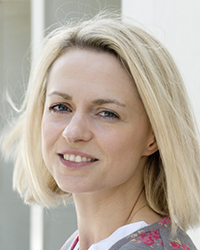2014 Janet Taylor Spence Award

Angelica Ronald
Birkbeck, University of London, United Kingdom
What is the focus of your award-winning research?
I have been conducting research on the genetic and environmental causes of autism and autistic traits for over 10 years. This topic is clinically important and continues to fascinate me. In my research I have employed family, twin, and genome-wide association study designs, amongst others. Another strand of my research explores the causes of psychotic experiences in adolescence. More recently I established an interdisciplinary collaboration to investigate how individual differences in attentional styles in infancy might predict later psychopathology. In sum, I aim to identify and understand causal predictors of complex disorders — such as autism and schizophrenia — across the lifespan from infancy to adulthood. Hence the name of my group, the Genes Environment Lifespan laboratory.
How did you develop an interest in this area?
It began with an interest in what causes people to be different. I admired my science teachers, read some inspiring books (such as The Man Who Mistook His Wife for A Hat by Oliver Sacks) and took notice of the New Scientist magazines knocking around my family home. During my undergraduate degree in Experimental Psychology at Oxford University I decided to pursue the themes of my two favorite modules, Abnormal and Developmental Psychology. It helps that the human brain is the most interesting thing in the world.
Who are your mentors and/or biggest psychological influences?
I’ve had admirable, intelligent, and generous scientists as mentors and supervisors throughout my career. I am grateful that at my PhD interview the panel felt that I had potential to think carefully, despite me dropping a large pile of papers in front of them all! Robert Plomin was an incredible supervisor from whom I learnt a lot. Francesca Happé was hugely supportive during my PhD and postdoctoral training. She is a role model as an eminent female scientist who is also a full-time working mother. I feel indebted to Tony Charman and Mark Johnson, whose support, characterized by “gentle nudges in the right direction,” has been invaluable since I joined Birkbeck in London.
What unique factors have contributed to your early success?
These won’t be unique factors, but I have a very supportive family. I don’t mind working at odd hours, and I like the variety of academic life. I have received some really good advice along the way. I recall a day when reviews for one of my first manuscripts came back from a journal. My supervisor said, “How people respond to reviews is a good indicator of how they will do in an academic career.” To me it seemed a wise comment: Criticism in science is often very helpful.
What does winning this award mean to you both personally and professionally?
Professionally, I am delighted if this award brings greater attention to work on the causes of conditions such as autism and schizophrenia and their related traits. Personally, I am honored to win this award, which has such an impressive list of past recipients and which comes from the eminent APS.

